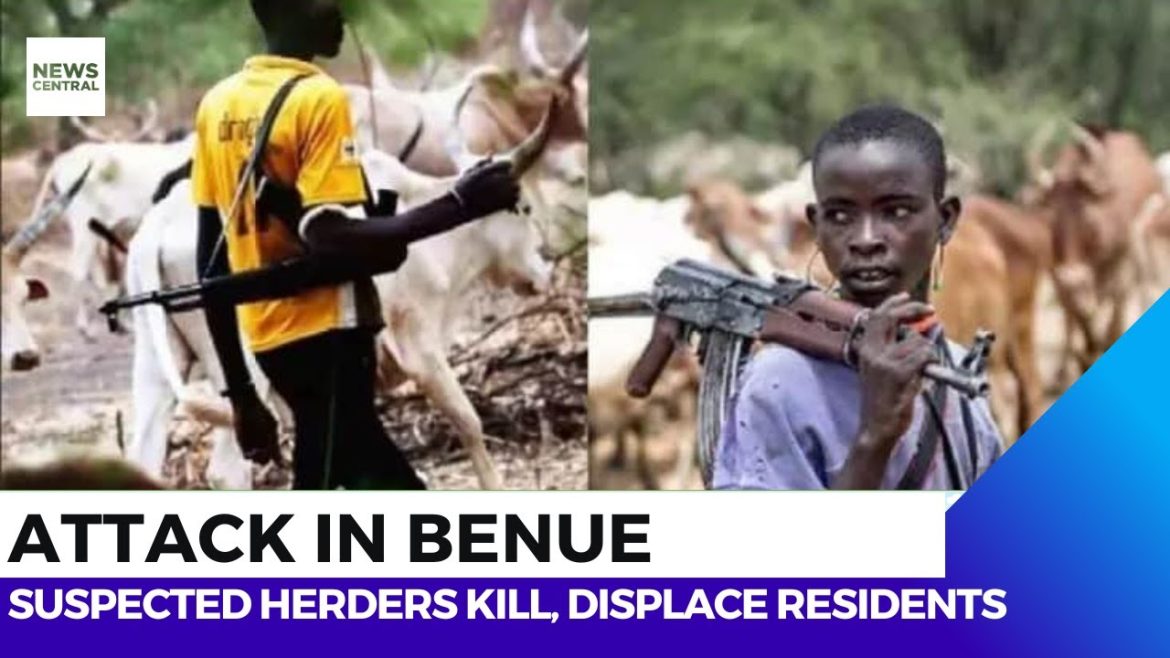479
By Tracy Moses
The Benue Non-Governmental Network (BENGONET) has raised concerns over the displacement of over 150,000 people in Kwande Local Government Area (LGA), a situation worsened by repeated attacks by armed herders.
Speaking at a press conference on Wednesday in Makurdi, the Benue State capital, the group condemned the ongoing neglect of displaced persons, who have not received adequate humanitarian aid or shelter despite promises made by the state government.
Victims of violence are yet to be relocated to designated Internally Displaced Persons (IDP) camps, even though the state government had pledged this support six months ago.
The Chairman of BENGONET, Lazarum Mom shared details from a recent two-day field visit to Jato-Aka and surrounding areas in Kwande. He witnessed the dire conditions of the displaced population, describing the overcrowded situation as “a can of sardines.” Many families are now living under harsh conditions, with children facing severe malnutrition.”
Since the violence began in 2011, over 5,700 lives have been lost in Kwande LGA, according to BENGONET’s comprehensive field assessments and discussions with community members, including women, children, the elderly, and persons with disabilities. The violence has led to the destruction of homes, worship centers, schools, markets, health facilities, and farmlands across five council wards, decimating the socio-economic and cultural fabric of the communities.
“The situation on the ground is deeply concerning. What we witnessed in Jato-Aka reflects the long-standing neglect and unaddressed crisis that continues to affect the people of Kwande. These people have lost everything, yet they remain forgotten by both state and federal authorities,” he said.
BENGONET also identified several root causes of the conflict, including unresolved boundary disputes between the Turan community in Benue and the Jukun community in neighboring Taraba State. Additionally, unregulated open grazing and poor enforcement of the Anti-Open Grazing Law have intensified attacks by armed herders, fueling a cycle of violence. Insufficient security presence and a lack of coordinated humanitarian responses have further exacerbated the crisis.
“During our visit, we spoke with over 699 individuals, gathering insights into the root causes of the conflict. The findings were alarming. Deep-seated issues, from boundary disputes to unregulated grazing practices, must be addressed for lasting peace,” Mom added.
While the state government has made some efforts to address the crisis, BENGONET stated that these efforts have not provided meaningful relief to the affected populations. The absence of formal IDP camps, poor road infrastructure, and inadequate security measures have made it nearly impossible for displaced persons to regain their dignity and rebuild their lives.
BENGONET called on the Federal Government to facilitate dialogue between the Benue and Taraba state governments, with the National Boundary Commission playing a key role in resolving the territorial disputes. The group also urged the government to enforce the Anti-Open Grazing Law more effectively and, if necessary, review the law to better protect rural communities.
Mom recommended the establishment of a permanent security outpost in Turan to restore peace and deter further attacks. He also called for the construction of strategic roads to enhance emergency responses and improve connectivity, along with supporting community vigilante groups to strengthen grassroots security efforts under the supervision of formal security agencies.
“This is a cry for justice and a call for action,” Mom said. “We demand that the government take immediate steps to address the dire situation faced by our people. It is time for concrete actions, not just promises.”
Concluding, BENGONET emphasized the need for a comprehensive and coordinated humanitarian response. The organization called for collaboration between the Benue State Emergency Management Agency (SEMA) and the National Emergency Management Agency (NEMA) to establish formal IDP camps and provide adequate support to displaced families.
“The suffering of these people has gone on for far too long,” Mom concluded. “We stand ready to assist in any way we can, but the time for talk has passed. The government must act now, before more lives are lost and more communities are destroyed.”



